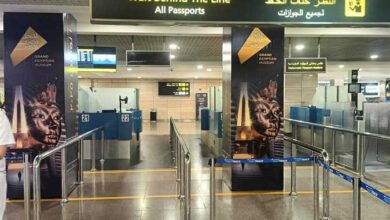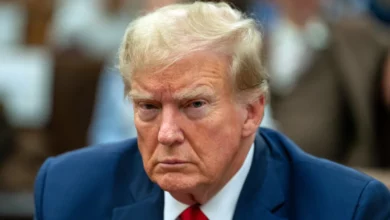Rafah and Arish – In the first week of June, a group of Bedouin tribesmen living on the Palestinian side of the border in Rafah reportedly crossed through the tunnels to Egypt, killed fellow members of the Remeilat tribe and then returned to Gaza. At stake was a longstanding land dispute.
In the same week, Fawakhreya tribesmen kidnapped someone from the Tayaha tribe in retaliation for the kidnapping of 10 of their men, local Bedouins say. The dispute began with a Tayaha tribesman carjacking a member of the Fawakhreya tribe.
There is a security void across Egypt in the wake of the uprising, but in North Sinai, is it taking a different turn. Before the beginning of the revolution, many described the status quo in North Sinai as a mounting conflict between the tribal nature of the peninsula and the security forces as they sought to forcibly impose the structures of a state there.
With security gone, tribalism prevails. With the whole country’s political future in a state of uncertainty, the pressing question is how to reconcile the presence of the state with the peninsula’s prevalent tribalism.
“We don’t care who rules. In all cases, they rule on their own and we rule ourselves. Tribalism is what rules us really,” said Ismail Gomaa, a trader and Bedouin from the Remeilat, a major tribe in North Sinai. “I don’t see a way for the police to come back and operate fully in Sinai. Military rule is best for now.”
Gomaa says that Sinai’s revolution was mostly against the police, particularly the State Security Investigations Service. In the last five years, State Security has arbitrarily detained Bedouins from the area, especially in the wake of terrorism attacks that hit the peninsula in 2004, 2005 and 2006. The military’s light-handedness in the region leads many to believe that they would be better rulers.
The state and the security forces are aware of the challenges. According to Abdel Wahab Mabrouk, governor of North Sinai, a new security strategy in North Sinai will consist of placing more people from the peninsula inside police stations to work with policemen.
Arms proliferation is a marker of the security void in North Sinai. Cheap arms have reportedly been acquired through the tunnels into Gaza.
“There will also be a process for the collection of weapons, with the help of the armed forces. We will start with sending an ultimatum before enforcing collection,” Mabrouk told Al-Masry Al-Youm.
But the ownership of weapons by ordinary people in the region dates back to pre-revolutionary times.
“It’s a Bedouin culture and it was reinforced by the constant tensions with the security before the revolution,” said Sherif Ismail, the governor’s security adviser. According to him, while arms were mostly owned by Bedouins outside of the city of Arish, now the people of Arish are also acquiring weapons.
“They feel it’s important for the balance of power, now that there is no security,” Ismail said.
Resorting to urf, the customary law recognized by the tribes to resolve their conflicts outside the frame of state laws, has always been at the forefront of tensions with the security apparatus. But its implementation has been a challenge.
“Everyone in the tribes interprets urf as they please, which further creates problems and armed conflicts,” said Ismail, who has been trying to broker reconciliation deals amongst tribes, an initiative that has been largely unsuccessful, reportedly because it came from an untrusted government.
“The Ministry of Interior has recognized its mistakes in Sinai,” said Ismail. “Implementing the rule of law and preserving national security is no longer tied to how we deal with Bedouins, but how we work with them and gain their trust.”
Ramadan said the people of North Sinai have been reverting to Islamic groups to resolve conflicts using shar’, which translates into some interpretation of the Quran. According to him, a group like Al-Da’awa wal Sunna, an Islamist organization now omnipresent in North Sinai, is playing a key role in this area. After the uprising, Al-Da’awa wal Sunna was active in filling the security void by forming popular committees to protect different neighborhoods, while eventually also becoming conflict resolution brokers. The group has reportedly emerged as more powerful now that many members are out of prison.
A more militant group, Al-Takfeer wal Hijra, is said to be behind burning police stations and State Security buildings after the revolution began.
“They were the heart of the revolution. Their need to avenge the torture of their people and their long-time detention was stronger than anyone else’s,” Gomaa said.
The Muslim Brotherhood, Egypt’s largest and oldest Islamist organization, has been quick to assume a role amid the area’s mounting tribal tensions. A multi-story, freshly-painted building houses the Brotherhood’s new political party, the Freedom and Justice Party, in Arish. It faces one of the city’s main police stations.
Abdel Rahman al-Shorbagy, a member of the Brotherhood and previous member of parliament, said the group is working on a project to document urf laws, as a precursor to its inclusion in civil laws.
“Urf law is a comprehensive and strong one," he said. "But urf judges are not always able to work professionally, since some of them are corrupt. So why don’t we work together, as Brothers and tribesmen, on institutionalizing this law?”
Shorbagy doesn’t believe that urf should replace civil law and its implementation by the police, though. In general, he speaks of the necessity of returning to Sinai haybit al-dawla, the state’s prestige. That, he says, could reflect the Brothers’ longstanding state project, one that has been in waiting for 83 years.
Shorbagy doesn’t subscribe to the widespread belief among Bedouins that the military is better off running Sinai than the police.
“Sinai is ruled by the Camp David Accords. It’s difficult for the military to be highly involved in running the governorate. The general situation now doesn’t allow for a discussion about changing the Camp David rules," Shorbagy said.
Yehia al-Ghoul, an urf judge, thinks that the urf is only a complementary instrument to state institutions, which have to come back into full force.
“Urf can be used for personal issues. But issues of national security have to be referred to state laws," he said.
Like Shorbagy, Ghoul sees that the central state ought to have a strong presence in Sinai because of its sensitivity as a border area. That is why, he says, propositions for local governance, including electing governors, are not acceptable.
“We are not a federal state here. The central state has to remain the source of all powers,” he said. For him, the key to solving growing dissidence in Sinai is development, manifested in more job opportunities, more infrastructural investments and more.
Youth groups have focused their battle around a development agenda as the basis for state building in Sinai.
“We think attracting investment and encouraging tourism is the key to ending ongoing problems here,” said Basma Refai, a lawyer and member of the North Sinai Youth Coalition.
Refai, who works with legal systems, says that her group is more inclined to implement a civil law, which would be central to regulating development and tourism endeavors.
But next to sheikhs, their voices are not strong enough. “When [Prime Minister] Essam Sharaf met [in late April] with Sinai leaders, there was no youth participation. He only met with the traditional leaders who operated under Mubarak’s regime,” she said.
Sinai is still widely considered a peripheral part of Egypt, but some of the emerging political forces are taking notice of the area, including new parties such as business tycoon Naguib Sawiris’ Free Egyptians Party. The way forward remains opaque.



